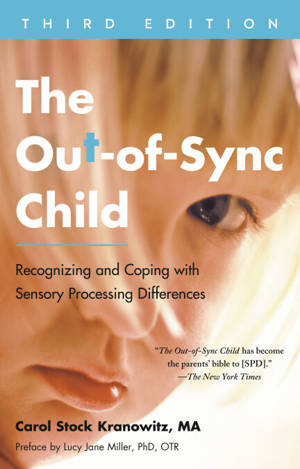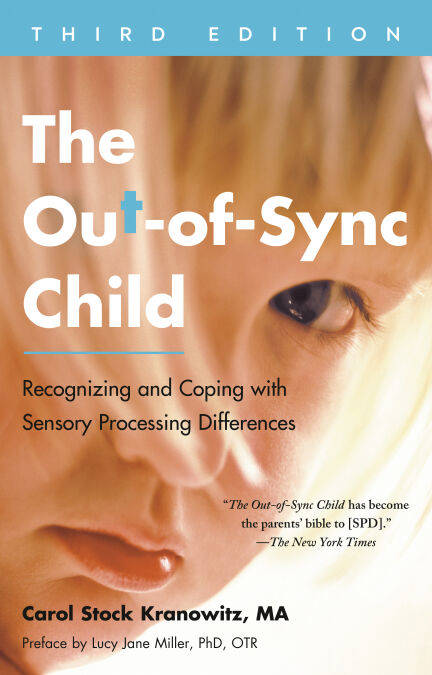
- Afhalen na 1 uur in een winkel met voorraad
- Gratis thuislevering in België vanaf € 30
- Ruim aanbod met 7 miljoen producten
- Afhalen na 1 uur in een winkel met voorraad
- Gratis thuislevering in België vanaf € 30
- Ruim aanbod met 7 miljoen producten
Zoeken
The Out-of-Sync Child, Third Edition E-BOOK
Recognizing and Coping with Sensory Processing Differences
Carol Stock Kranowitz
€ 17,34
+ 17 punten
Uitvoering
Omschrijving
2022 Mom's Choice Gold Award Winner
The groundbreaking book that explains Sensory Processing Difference (SPD)--and presents a drug-free approach that offers hope for parents--now revised and updated.
Does your child exhibit...
Over-responsivity--or under-responsivity--to touch or movement? A child with SPD may be a "sensory avoider," withdrawing from touch, refusing to wear certain clothing, avoiding active games--or he may be a "sensory disregarder," needing a jump start to get moving.
Over-responsivity--or under-responsivity--to sounds, sights taste, or smell? She may cover her ears or eyes, be a picky eater, or seem oblivious to sensory cues.
Cravings for sensation? The "sensory craver" never gets enough of certain sensations, e.g., messy play, spicy food, noisy action, and perpetual movement.
Poor sensory discrimination? She may not sense the difference between objects or experiences--unaware of what she's holding unless she looks, and unable to sense when she's falling or how to catch herself.
Unusually high or low activity level? The child may be constantly on the go--wearing out everyone around him--or move slowly and tire easily, showing little interest in the world.
Problems with posture or motor coordination? He may slouch, move awkwardly, seem careless or accident-prone.
These are often the first clues to Sensory Processing Difference--a common but frequently misdiagnosed problem in which the central nervous system misinterprets messages from the senses. The Out-of-Sync Child offers comprehensive, clear information for parents and professionals--and a drug-free treatment approach for children.
This revised edition includes expanded information about SPD “look-alikes,” including Learning Disabilities, ADHD, and autism; about diagnosis and treatments; and about other topics.
The groundbreaking book that explains Sensory Processing Difference (SPD)--and presents a drug-free approach that offers hope for parents--now revised and updated.
Does your child exhibit...
Over-responsivity--or under-responsivity--to touch or movement? A child with SPD may be a "sensory avoider," withdrawing from touch, refusing to wear certain clothing, avoiding active games--or he may be a "sensory disregarder," needing a jump start to get moving.
Over-responsivity--or under-responsivity--to sounds, sights taste, or smell? She may cover her ears or eyes, be a picky eater, or seem oblivious to sensory cues.
Cravings for sensation? The "sensory craver" never gets enough of certain sensations, e.g., messy play, spicy food, noisy action, and perpetual movement.
Poor sensory discrimination? She may not sense the difference between objects or experiences--unaware of what she's holding unless she looks, and unable to sense when she's falling or how to catch herself.
Unusually high or low activity level? The child may be constantly on the go--wearing out everyone around him--or move slowly and tire easily, showing little interest in the world.
Problems with posture or motor coordination? He may slouch, move awkwardly, seem careless or accident-prone.
These are often the first clues to Sensory Processing Difference--a common but frequently misdiagnosed problem in which the central nervous system misinterprets messages from the senses. The Out-of-Sync Child offers comprehensive, clear information for parents and professionals--and a drug-free treatment approach for children.
This revised edition includes expanded information about SPD “look-alikes,” including Learning Disabilities, ADHD, and autism; about diagnosis and treatments; and about other topics.
Specificaties
Betrokkenen
- Auteur(s):
- Uitgeverij:
Inhoud
- Aantal bladzijden:
- 416
- Taal:
- Engels
- Reeks:
Eigenschappen
- Productcode (EAN):
- 9780593541449
- Verschijningsdatum:
- 18/04/2022
- Uitvoering:
- E-book
- Beveiligd met:
- Adobe DRM
- Formaat:
- ePub

Alleen bij Standaard Boekhandel
+ 17 punten op je klantenkaart van Standaard Boekhandel
Beoordelingen
We publiceren alleen reviews die voldoen aan de voorwaarden voor reviews. Bekijk onze voorwaarden voor reviews.







